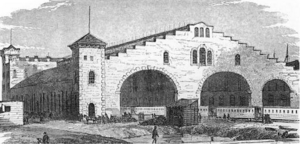Great Central Station
| Great Central Station | |
|---|---|
|
Illustration of the train shed which appeared in Frank Leslie's Illustrated Newspaper in 1856, shortly after the station opened. | |
| General information | |
| Status | Demolished |
| Address | South Water Street and Michigan Avenue |
| Town or city | Chicago, Illinois |
| Country | United States |
| Coordinates | 41°53′10″N 87°37′24″W / 41.88611°N 87.62333°WCoordinates: 41°53′10″N 87°37′24″W / 41.88611°N 87.62333°W |
| Opened | June 21, 1856 |
| Closed | April 17, 1893 |
| Owner | Illinois Central Railroad |
| Design and construction | |
| Architect | Otto H. Matz |
Great Central Station, also known as Great Central Depot,[nb 1] was an intercity train station in Chicago, Illinois owned by the Illinois Central Railroad. It opened in 1856 and for a time was the largest building in downtown Chicago. It was damaged in the Great Chicago Fire of 1871 but remained in operation. The station proved inadequate to handle growing traffic and was demolished in 1893 in favor of Central Station. Millennium Station, formerly Randolph Street Terminal, sits on the location.
Design
The station was designed by Otto H. Matz and included both a head house and a train shed. The most distinctive feature of the train shed was the three masonry arches fronting the wooden structure. Architectural historian Carroll Meeks criticized the front of the head house, calling it an "ill-assorted complex of disparate elements."[1] Carl W. Condit cited the design as an example of vernacular architecture.[2]
The train shed incorporated a Howe truss in its design and measured 166 feet (51 m) wide and 36 feet (11 m) high. Only Birmingham New Street railway station had a wider roof. On its completion the station was the largest building in Chicago.[3] In 1871 the Great Chicago Fire destroyed the train shed, which was never rebuilt. A subsequent fire in 1874 damaged the head house.[1]
Services
Great Central Station officially opened on June 21, 1856. It was the Illinois Central's first permanent station in Chicago and cost US$250,000. Originally the Great Central served three railroads: the Illinois Central, which stayed there until the station closed in 1893; the Michigan Central Railroad; and the Chicago, Burlington and Quincy Railroad (the Burlington). The Burlington moved to the new Union Depot (predecessor to today's Union Station) in 1881. Other railroads which used the station prior to 1871 included the Galena and Chicago Union Railroad (a predecessor to the Chicago and North Western) and the Chicago and Alton Railroad (a predecessor to the Alton Railroad). The Cleveland, Cincinnati, Chicago and St. Louis Railway (the "Big Four") used it from 1886 to 1893.[4]
Traffic peaked at 100 intercity passenger trains per day in the early 1890s, not including suburban (what would now be called commuter) trains. The Illinois Central constructed a new facility, Central Station, to meet the traffic demands of the World's Columbian Exposition. That station opened on April 17, 1893, and Great Central was demolished.[3][2] Suburban trains continued to stop north of Central Station where Millennium Station now stands.
Notes
- ↑ Contemporary sources referred to the "Great Central Depot" or "Central Depot", but secondary sources call it the "Great Central Station".
References
- 1 2 Meeks, Carroll L. V. (1956). The Railroad Station: An Architectural History. New Haven: Yale University Press. pp. 72–74. OCLC 1030508.
- 1 2 Condit, Carl W. (1964). 'The Chicago School of Architecture: A History of Commercial and Public Building in the Chicago Area, 1875–1925. University of Chicago Press. p. 9. ISBN 978-0-226-11455-2.
- 1 2 Downey, Clifford J. (2007). Chicago and the Illinois Central Railroad. Images of rail. Charleston, SC: Arcadia Publishing. p. 8–9. ISBN 0738550744. OCLC 169870743.
- ↑ Lind, Alan R. (1986). Limiteds Along the Lakefront: The Illinois Central in Chicago. Park Forest, IL: Transport History Press. pp. 5–7. OCLC 20171887.
